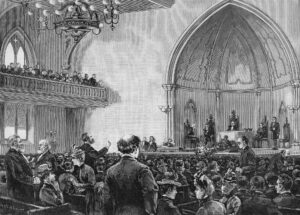By Antony McCallum: Who is the uploader, photographer, full copyright owner and proprietor of WyrdLight.com (http://www.wyrdlight.com Author: Antony McCallum) [Attribution or CC BY-SA 4.0], via Wikimedia Commons
Anglicanism in the West has suffered the poisons of theological Liberalism and has over time developed fixations on symbolic ritual. Both theological Liberalism and these fixations have shifted the focus of worship away from the pure Word of God. Meanwhile, the Articles, which were intended to preserve the Biblical integrity of Anglicanism, have largely lost their rightful place.
The Articles, nevertheless, provide Anglicanism with its identity; without them, Anglicanism isn’t Anglican—nor is it Protestant for that matter. Believers should thus affirm their faith in and through the Articles. Although subscription to the Articles is only required of the ordained ministers, there are three reasons why Anglicans who aren’t pastors should read the Thirty-Nine Articles.
The Articles Provide Spiritual Perimeters
Before the Reformation, many pagan and superstitious beliefs had made their way into the Church, and these beliefs had blurred the simple gospel. Although the Reformation was about clarifying the truth, some Protestants believed the Reformers weren’t going far enough in restoring the Church. For these reasons, the Thirty-Nine Articles were composed for the Christians in England.
These theological declarations were meant to expose false doctrines and to prevent misguided teachings from moving the Church away from orthodoxy. At a time when the Bible was being translated for and placed into the hands of the common person, the Articles provided healthy theological perimeters for people to understand the clear teachings of the Bible.
Thomas Cranmer’s influence may be seen throughout the Articles, which point us to the Word of God and instruct us to come under its teachings rather than those of human invention. Consider the following examples:
Article 6 sets a high example by stating that “Holy Scripture contains all things necessary for salvation,” so that anything that cannot be proven by the Bible cannot be required of believers.
Article 8 urges us to use and believe the historic Creeds, because “they may be proved by most certain warrants of holy Scripture,” clearly showing where authority lies.
Article 22, for example, highlights that doctrines of human invention should not overrule the Scriptures. It states that purgatory and its siblings are “a fond thing vainly invented, and grounded upon no warranty of Scripture, but rather repugnant to the Word of God.”[1]
Article 20 also stresses the supreme authority of the Bible over God’s Church. This article declares, “it is not lawful for the Church to ordain any thing that is contrary to God’s Word written.”[2]
Clearly, the Articles hold that the Bible must be central to worship. Cranmer’s goal was “that the people (by daily hearing of holy Scripture read in the Church) might continually profit more and more in the knowledge of God, and be the more inflamed with the love of his true Religion.”[3]
Although the troublesome doctrines that permeate the Church today may not be the same as those of the Reformation period, there is pressure for the Church to accept cultural trends and new winds of doctrine. Therefore, in our contemporary Canadian context, we too should read the Articles. They remind us not give our culture more authority than the Word of God, and they set boundaries that highlight teachings that stray from what the Bible actually says.
The Articles Provide Spiritual Growth
Several years after my conversion, I went through a season of isolation, where I became a YouTube Christian. I spent hours online listening to many different teachings which stalled my Christian growth. Of course, part of this setback in my Christian walk came from not being surrounded by other believers. At the same time, my spiritual growth was largely stunted because I was tossed back and forth by every wind of doctrine and false teachings (Eph 4:14).
The New Testament letters teach us that there is a necessary progression in our Christian walk towards spiritual maturity, part of which involves becoming acquainted with Biblical doctrine (Heb 5:12-14; 6:1-4; 2 Pet 3:16-18, etc.). Growing in our understanding of Biblical doctrine does not necessarily involve becoming vocational theologians, and it doesn’t mean that all grey areas in our doctrines will become crystal clear to us. Growing in our understanding of Biblical doctrine principally means developing a well-founded assurance in our salvation and seeing this assurance lead to our Christian worldview impacting all other areas of our lives.
As Christians, Anglicans have an opportunity and responsibility to grow in familiarity with Biblical doctrines. The Thirty-Nine Articles provide a valuable starting point.
The Articles Provide Spiritual Defense
False teaching in the Church is no laughing matter. The Bible calls Christians to “honor Christ the Lord as holy, always being prepared to make a defense to anyone who asks for a reason for the hope that is in [them]; yet do it with gentleness and respect” (1 Pet 3:15). Lay Anglicans need to be ready to give a winsome defense of their faith.
As mentioned above, the Articles were a statement of defense against the mistaken teachings of Rome and radical Protestantism. The “way of theological thinking [that the Thirty-Nine Articles] embody”[4] communicates the importance of defending sound doctrine and truth. The Articles thus move us to answer the Biblical call to be apologists in our time and culture. They should embolden us to be ambassadors who confront the postmodern and post-truth challenges that are increasing in Canada.
The paradigm shifts that have occured in Canada need to be addressed by Christians, who must answer questions and challenges about, for instance, the Trinity, sin, free will, the role of the Bible, and our justification before God. Anglicans have the opportunity to be Biblically literate and able to handle God’s Word with accuracy. Acquaintance with the Thirty-Nine Articles grounds Anglicans in their witness, encouraging them to be faithful to Jesus and clear in their message.
Conclusion
The Thirty-Nine Articles of Religion provide inherent spiritual perimeters that promote the sufficiency and role of the Bible in our Christian life. Moreover, the doctrinal nature of the Articles encourages spiritual growth in our knowledge and trust in God, and their apologetic bent show us the importance and principles of defending our faith in our time and place.
J. I. Packer explains that “subscription to the Articles should indicate that a man has sought to test the Articles by Scripture and has found them ‘agreeable to the Word of God’” and that, having tested them, resolves “to preach the gospel which they define, and to oppose all doctrines, however popular and fashionable, which explicitly or implicitly contravene them.”[5]
Because the Articles set spiritual perimeters, foster spiritual growth, and train us to defend our faith, even Anglicans who aren’t pastors should become familiar with the Thirty-Nine Articles.
[1] Book of Common Prayer, (Toronto: Anglican Book Centre, 1962), 707.
[2] Ibid., 706.
[3] Ibid., 715.
[4] J. I. Packer, The Thirty-Nine Articles (Vancouver: Regent College Publishing, 2007), 71.
[5] Ibid., 71-72.






















